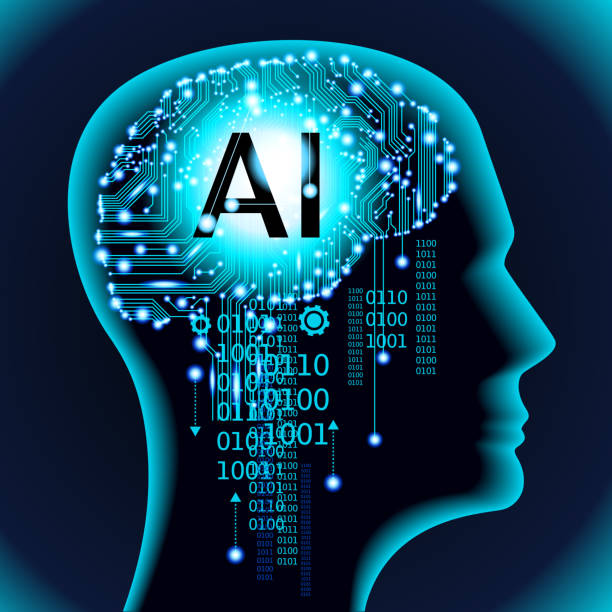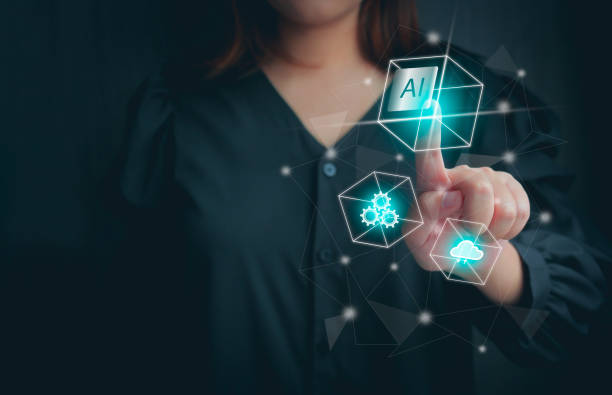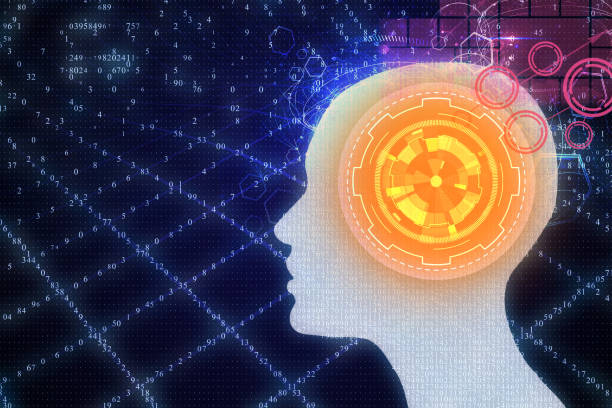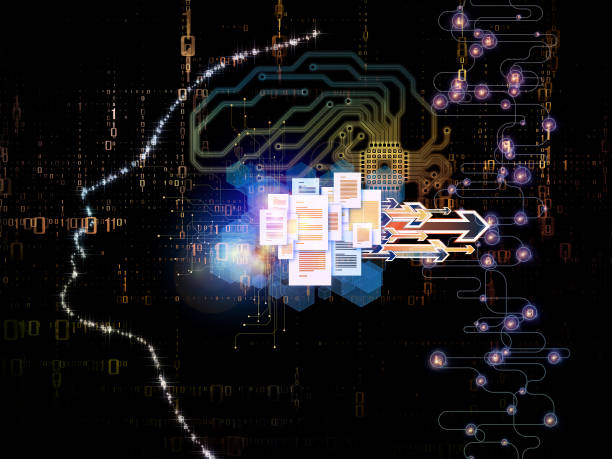What is Artificial Intelligence and Why is it Important?
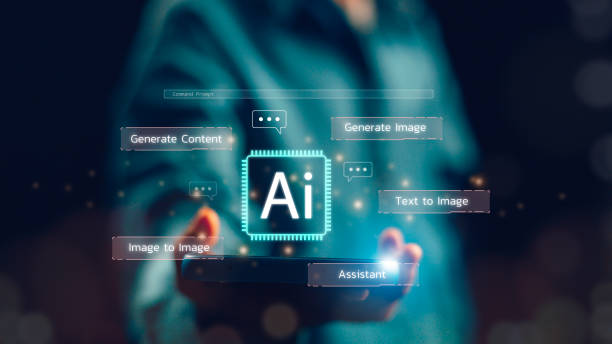
Artificial Intelligence (#AI) is a branch of computer science that deals with building machines capable of performing tasks that usually require human intelligence.
These tasks include learning, problem-solving, pattern recognition, natural language understanding, and decision-making.
The importance of #Artificial_Intelligence in today’s world is rapidly increasing, as this technology can revolutionize various industries and significantly boost productivity.
From automating repetitive processes to analyzing complex data, AI has wide-ranging applications.
The future of AI jobs is highly dependent on understanding this technology and the ability to use it in different fields.
One of the most important reasons for the importance of artificial intelligence is its ability to automate processes.
This not only leads to increased speed and accuracy in tasks but also reduces costs.
For example, in the manufacturing industry, AI-powered robots can perform repetitive and dangerous tasks, while in the service industry, chatbots can answer customer questions and solve their problems.
On the other hand, AI plays a very important role in data analysis.
By using machine learning algorithms, patterns and trends in data can be identified that are not visible to humans.
This information can help organizations make better decisions and improve their strategies.
As a result, the future of AI jobs is very bright and promising for individuals specializing in this field.
Research shows that 80% of customers trust companies with a professional website more. Does your current website inspire this trust?
With Rasaweb’s corporate website design services, solve the problem of customer mistrust and a weak online image forever!
✅ Create a professional image and increase customer trust
✅ Attract more sales leads and grow your business
⚡ Get free consultation
The Impact of Artificial Intelligence on the Job Market
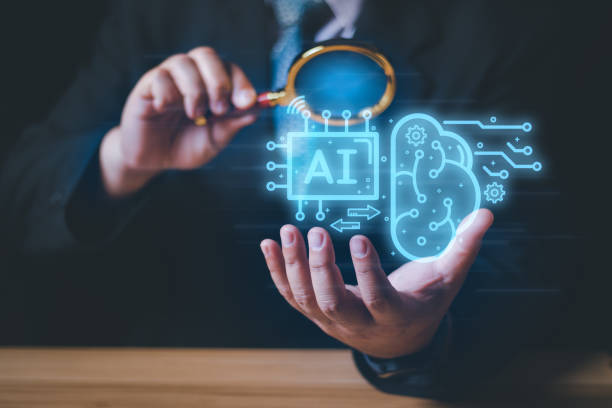
The impact of artificial intelligence on the job market is a complex and multifaceted issue that brings both opportunities and challenges.
On the one hand, AI can automate many jobs currently performed by humans.
This may lead to job losses in some industries, especially in occupations with repetitive and routine tasks.
However, on the other hand, AI can also create new jobs and provide new employment opportunities in various fields.
These new jobs often require more specialized skills and can contribute to increased productivity and economic growth.
One of the most significant impacts of artificial intelligence on the job market is the change in the nature of jobs.
With technological advancements, many jobs require new skills that were not previously needed.
For example, there is currently a rapidly increasing demand for data scientists, artificial intelligence engineers, and cybersecurity experts.
These individuals are responsible for developing, implementing, and maintaining AI systems.
Furthermore, AI can help humans perform their work better and more efficiently.
By using AI-powered tools, employees can complete their tasks faster and more accurately, and dedicate their time to more important activities.
This can lead to increased job satisfaction and an improved quality of life for employees.
As a result, the future of AI jobs offers many opportunities for both specialists in this field and individuals who use AI-powered tools.
Jobs at Risk of Automation and New Jobs
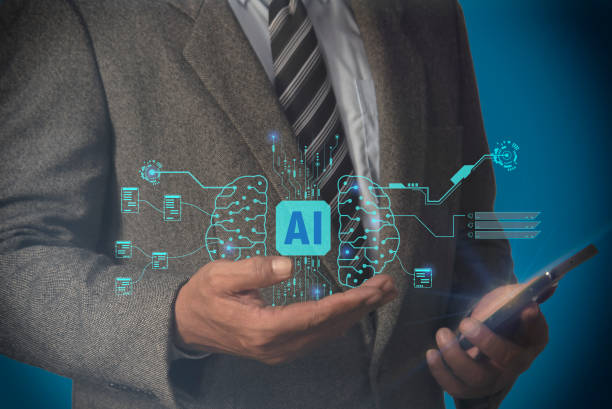
Artificial Intelligence (AI) and automation are increasingly reshaping the job market.
Understanding which jobs are at risk of automation and which new jobs are being created is crucial for career planning and education.
Jobs at Risk
Jobs that involve repetitive, routine, and rule-based tasks are more susceptible to automation.
These jobs include:
- Data Entry Operators: Simple and repetitive data entry tasks are easily performed by automation software.
- Assembly Line Workers: Robots and automation systems are increasingly used in assembly lines to perform repetitive tasks.
- Truck and Taxi Drivers: Autonomous driving technology is rapidly advancing and could eventually replace human drivers.
- Customer Service Representatives: Chatbots and Interactive Voice Response (IVR) systems can increasingly perform the tasks of customer service representatives.
- Accountants and Auditors: Accounting software and automation can automate many tasks of accountants and auditors.
New Jobs
While AI threatens some jobs, it also creates new ones.
These jobs include:
- Artificial Intelligence Engineers: These professionals design, develop, and implement AI systems.
- Data Scientists: Data scientists analyze big data to extract valuable insights.
- Machine Learning Specialists: These specialists develop and train machine learning algorithms.
- AI Ethics Specialists: These specialists ensure that AI systems are developed and used ethically and responsibly.
- Cybersecurity Specialists: With increasing reliance on technology, demand is rising for cybersecurity specialists who can protect systems and data from cyberattacks.
Table 1: Jobs at Risk of Automation
| Job | Risk Level |
|---|---|
| Data Entry Operators | High |
| Assembly Line Workers | High |
| Truck and Taxi Drivers | Medium |
| Customer Service Representatives | Medium |
| Accountants and Auditors | Medium |
In summary, the future of AI jobs requires adaptability and continuous learning.
Individuals who learn new skills and adapt to new technologies will be best positioned for success in the future job market.
Skills Required for Success in the Age of Artificial Intelligence

To succeed in the age of artificial intelligence, possessing specific skills is essential.
These skills include technical skills, soft skills, and analytical skills.
Technical skills include knowledge and expertise in fields such as programming, machine learning, data analysis, and neural networks.
Individuals specialized in these areas can develop, implement, and maintain AI systems.
Soft skills include communication skills, problem-solving skills, teamwork skills, and leadership skills.
These skills help individuals communicate effectively with others, solve problems, and succeed in a team work environment.
Analytical skills include the ability to analyze data, identify patterns, and extract useful information from data.
These skills help individuals make better decisions and improve their strategies.
In addition to these skills, critical thinking and the ability for continuous learning are also very important.
Given the rapid pace of technological advancement, individuals must always be learning new skills and adapting to changes.
Also, critical thinking helps individuals effectively evaluate information and make logical decisions.
The future of AI jobs is very bright for individuals who possess these skills.
Do you know that customers’ first impression of your company is your website? With a powerful corporate website from Rasaweb, multiply your business’s credibility!
✅ Custom and eye-catching design tailored to your brand
✅ Improved user experience and increased customer attraction
⚡ Get a free consultation!
The Role of Education in Preparing the Workforce for Artificial Intelligence
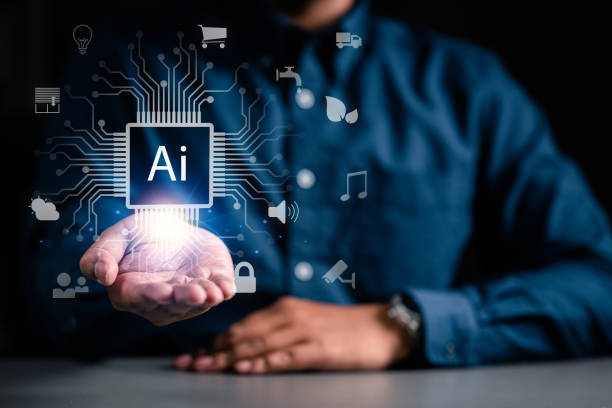
Education plays a very important role in preparing the workforce for the age of artificial intelligence.
Educational systems must be designed to equip students with the necessary skills for success in this era.
This includes teaching technical skills, soft skills, and analytical skills.
One of the most important steps in this regard is integrating AI concepts into curricula.
Students should become familiar with the basics of artificial intelligence, machine learning, and data analysis.
This can be achieved through specialized training courses, workshops, and practical projects.
Furthermore, educational systems should help students develop their soft skills as well.
This includes teaching communication skills, problem-solving skills, teamwork skills, and leadership skills.
These skills help individuals communicate effectively with others, solve problems, and succeed in a team work environment.
Also, educational systems should help students develop their analytical skills.
This includes teaching the ability to analyze data, identify patterns, and extract useful information from data.
These skills help individuals make better decisions and improve their strategies.
The future of AI jobs is highly dependent on educational systems being able to train a skilled workforce capable of using AI technologies in various fields.
Industries Most Affected by Artificial Intelligence
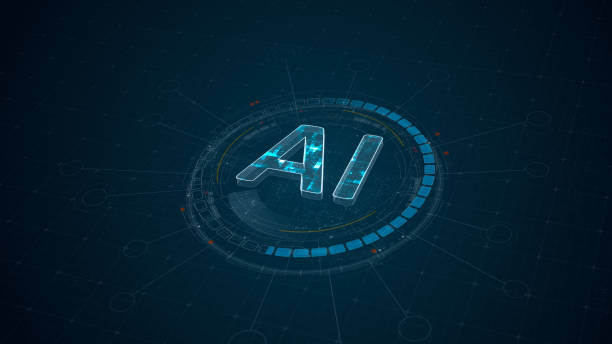
Artificial intelligence has widely permeated various industries and had significant impacts on them.
Some of the industries most affected by artificial intelligence include healthcare, manufacturing, financial services, retail, and transportation.
In the healthcare industry, AI can help diagnose diseases, develop new drugs, and improve patient care.
In the manufacturing industry, AI can help automate processes, improve product quality, and reduce costs.
In the financial services industry, AI can help detect fraud, manage risk, and provide personalized financial services.
In the retail industry, AI can help improve customer experience, optimize the supply chain, and increase sales.
In the transportation industry, AI can help improve safety, reduce traffic, and increase efficiency.
However, currently, artificial intelligence is still in its early stages of development, and its full potential is yet to be determined.
Nevertheless, with technological advancements, AI is expected to play a more significant role in various industries and have deeper impacts on them.
The future of AI jobs in these industries is very bright and promising.
Ethical and Social Challenges of Artificial Intelligence

Artificial intelligence, alongside its many benefits, also brings significant ethical and social challenges.
One of the most important of these challenges is the issue of bias and discrimination in AI algorithms.
If the data used to train algorithms contains biases, the algorithms will also learn these biases and may make discriminatory decisions.
For example, an AI-based recruitment system might unintentionally favor men over women if its training data contains information indicating that men are more frequently employed in managerial positions.
Another challenge is the issue of privacy and data security.
AI systems require large volumes of data for proper functioning, and this data often includes personal and sensitive information.
The collection, storage, and use of this data must be carried out in compliance with privacy and security principles to prevent misuse and unauthorized access.
Also, the issue of accountability for AI decisions is a significant challenge.
If an AI system makes a wrong decision that leads to damage, who will be responsible? The system developers, the users, or the system itself? These questions require careful consideration and the establishment of appropriate laws and regulations.
The future of AI jobs largely depends on our ability to solve these ethical and social challenges.
Table 2: Ethical and Social Challenges of Artificial Intelligence
| Challenge | Description |
|---|---|
| Bias and Discrimination | Algorithms may learn existing biases from training data. |
| Privacy and Data Security | Collection and use of personal data must adhere to privacy principles. |
| Accountability | Who is responsible for damages caused by AI decisions? |
| Transparency | The functioning and decision-making process of AI algorithms should be explainable. |
| Impact on Employment | Automation may lead to job losses in some industries. |
Future Research of Jobs in the Field of Artificial Intelligence
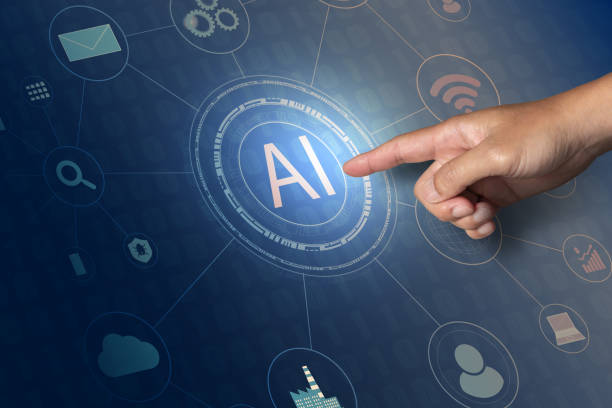
Future research of jobs in the field of artificial intelligence requires careful examination of technological trends, labor market needs, and social changes.
Given the rapid pace of technological advancement, accurately predicting the future of jobs is very difficult, but by examining current trends and forecasting future trends, a general picture of the future of jobs in this field can be drawn.
One of the important trends in the field of artificial intelligence is the increasing automation of processes.
This may lead to job losses in some industries, but on the other hand, it also creates new jobs.
Jobs that require more specialized skills and cannot be easily automated are likely to have higher demand in the future.
Furthermore, the role of artificial intelligence is expected to increase in various industries.
This requires specialists capable of developing, implementing, and maintaining AI systems.
Therefore, the demand for artificial intelligence engineers, data scientists, and machine learning specialists will likely increase in the future.
The future of AI jobs is very bright and promising for individuals specialized in these areas.
Does your current website convert visitors into customers, or does it drive them away? Solve this problem forever with a professional corporate website design by Rasaweb!
✅ Create credibility and powerful branding
✅ Attract target customers and increase sales
⚡ Get a free consultation now!
Strategies for Preparing for the Future of AI Jobs
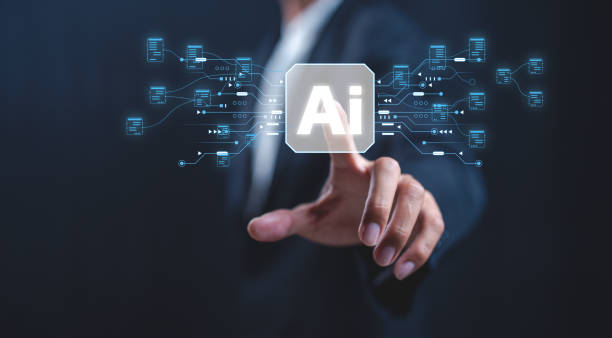
To prepare for the future of AI jobs, there are various strategies that can be adopted.
One of the most important of these strategies is learning new skills.
Given the rapid changes in the job market, individuals must always be learning new skills and adapting to new technologies.
This includes learning technical skills, soft skills, and analytical skills.
Another strategy is to focus on developing unique skills.
Jobs that require creativity, critical thinking, and problem-solving are likely to have higher demand in the future.
Therefore, individuals should strive to develop their skills in these areas.
Also, building strong professional networks can help prepare for the future of AI jobs.
Connecting with individuals working in the field of artificial intelligence can help individuals stay informed about the latest technological trends and identify new job opportunities.
The future of AI jobs is very bright for individuals who follow these strategies.
Conclusion – A Bright Future with Artificial Intelligence
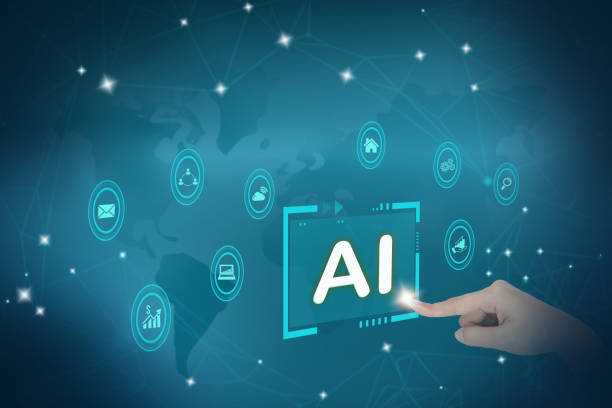
In conclusion, it can be said that artificial intelligence will have profound impacts on the job market and will significantly change the future of AI jobs.
While some jobs are at risk of automation, new jobs will also be created, and new employment opportunities will be provided in various fields.
To succeed in the age of artificial intelligence, individuals must learn new skills, focus on developing unique skills, and build strong professional networks.
By taking these actions, one can benefit from new job opportunities and shape a bright future in the field of artificial intelligence.
Artificial intelligence is not just a threat to jobs, but a great opportunity for growth and development.
By using AI technologies, productivity can be increased, costs can be reduced, and the quality of life can be improved.
Therefore, one should view artificial intelligence positively and strive to benefit from its advantages.
The future of AI jobs is very bright and promising for individuals who hold this perspective.
Frequently Asked Questions
| Question | Answer |
|---|---|
| What impact will artificial intelligence have on the future job market? | Artificial intelligence will automate repetitive jobs, but at the same time, it will create new and more complex jobs in areas such as the development, maintenance, and training of AI systems. |
| Which jobs are most at risk of being replaced by artificial intelligence? | Jobs involving repetitive, rule-based tasks with low need for creativity or emotional intelligence, such as some manufacturing jobs, data entry, and simple customer service, are most at risk. |
| What skills are essential for success in the future job market with the presence of artificial intelligence? | Skills such as critical thinking, complex problem-solving, creativity, emotional intelligence, data literacy, the ability to work with AI, and lifelong learning are of great importance. |
| Will artificial intelligence cause widespread unemployment? | Some jobs will disappear, but history has shown that new technologies, instead of widespread unemployment, reshape the job market and create new jobs. The need for adaptability and retraining is crucial. |
| What new job opportunities will emerge with the rise of artificial intelligence? | Jobs such as Machine Learning Engineer, Data Scientist, AI Ethicist, Human-AI Interaction Designer, and Digital Transformation Consultant are among the new opportunities. |
| What is the role of education in preparing for the future of jobs with AI? | Education should focus on developing soft skills, computational thinking, digital literacy, and the ability for continuous learning to prepare individuals for future changes. |
| How can I prepare myself for changes in the job market caused by artificial intelligence? | By learning new skills related to AI and data, strengthening soft skills, developing critical and creative thinking, and habitually engaging in lifelong learning, you can prepare yourself. |
| Will AI ethics become an important career field? | Yes, given increasing concerns about biases, privacy, and automated decision-making in AI, the role of AI ethics specialists will become crucial to ensure its responsible development. |
| What is the importance of human-AI collaboration in the future of jobs? | Human-AI collaboration, rather than competition, will shape the future job market. AI can be a tool to increase productivity and allow humans to focus on more complex and creative tasks. |
| Which industries will be most affected by artificial intelligence? | Almost all industries will be affected, but sectors such as healthcare, finance, transportation, manufacturing, education, and customer service are pioneers in adopting and transforming by artificial intelligence. |
And other advertising agency services from Rasa Web in advertising
Smart Custom Software: A professional solution for analyzing customer behavior with a focus on SEO-driven content strategy.
Smart UI/UX: A fast and efficient solution for digital branding with a focus on user experience customization.
Smart Social Media: A new service for increasing sales through custom programming.
Smart UI/UX: Professional optimization for increasing sales using marketing automation.
Smart Marketing Automation: Professional optimization for increasing click-through rates using attractive user interface design.
And over hundreds of other services in the field of internet advertising, advertising consultation, and organizational solutions
Internet Advertising | Advertising Strategy | Advertorial
Sources
The Future of AI Jobs
AI Job Opportunities
Challenges of AI in the Job Market
Artificial Intelligence and the Future of Jobs
? Are you looking to boost your business in the digital world?
Rasaweb Afarin Digital Marketing Agency, specializing in custom website design, Search Engine Optimization (SEO), and advertising campaign management, helps you establish a powerful and effective online presence.
Let us take your business to new heights with innovative and creative solutions. For a free consultation and more information, contact our experts.
📍 Tehran, Mirdamad Street, next to Bank Markazi, Southern Kazeroun Alley, Ramin Alley No. 6

